If you pay an airline for premium economy seating, is the amount you pay subject to the air transportation excise tax for the airline? The answer depends on whether the seating is necessary.
Given the smaller spaced allotted for each passenger, one conclude that premium seating is necessary.
The IRS determined that it is in PMTA 2019-11. Few would disagree with the holding, but the legal analysis is suspect.
What is Premium Economy Seating?
The IRS guidance describes premium economy seating as follows:
- a seat in the economy cabin of an aircraft (sometimes alternatively referred to as the “main cabin” or the “coach cabin”) that has more leg room than a standard economy seat but is otherwise the same as a standard economy seat and comes with no additional perks;
- a seat in the economy cabin that has more leg room than a standard economy seat but is otherwise the same as a standard economy seat and that comes bundled with one or more additional perks, such as but not limited to, free food and drinks, free or enhanced in-flight entertainment options, free Wi-Fi, priority check-in, expedited security, free checked bags, premium lounge access and/or early boarding;
- a seat in the economy cabin that is larger and has more leg room than a standard economy seat and that may or may not come bundled with one or more additional perks, such as but not limited to, free food and drinks, free or enhanced in-flight entertainment options, free Wi-Fi, priority checkin, expedited security, free checked bags, premium lounge access and/or early boarding; and
- a seat in a cabin that is separate from the economy cabin (and that is also separate from the business and/or first class cabin(s)) that has more leg room than a standard economy seat, that may or may not be larger than a standard economy seat, and that may or may not come bundled with one or more additional perks, such as but not limited to, free food and drinks, free or enhanced in-flight entertainment options, free Wi-Fi, priority checkin, expedited security, free checked bags, premium lounge access and/or early boarding.
So it is either a space with more leg room or that has additional perks.
What is the Air Transportation Excise Tax?
The air transportation excise tax is is imposed on those who transport people by air. It is a 7.5 percent fee imposed on the amount the passenger pays (it can also include an add on by flight segment).
It applies to flights that begin and end in the U.S. (or at any place in Canada or Mexico, not more than 225 miles from the nearest point on the border of the continental U.S.).
There have been a number of questions as to what amounts paid to airlines and others count as being paid for air transportation. For example, there have been disputes as to whether points acquired from hotel companies when one buys a hotel room are paid for air transportation if the points are used to buy the ticket.
The IRS has generally imposed a “necessary” standard in evaluating these disputes. Thus, the question is whether the payment is necessary to receive the air transportation services. This usually means it is a cost to board the airplane.
This brings us to the legal analysis that only a tax attorney would appreciate….
Is Extra Leg Room Necessary?
You can see from the above-definition of “premium economy seating” includes many items that are clearly not for boarding the plane, such as wifi, etc. But what about a better seat? Is that needed to board the plane?
The IRS compares the fee for moving to a larger seat in the same cabin with the charge for changing to first class in a different cabin. The first class ticket to sit in the first class cabin is an “extra fare” to board the plane.
But with economy seating, it is in the same cabin. The two seem to be entirely different. Moving from one location to another within the same cabin, is not an additional fee. The IRS did not reach this conclusion.
According to the IRS, the additional fee paid for extra leg room is subject to the excise tax. Given the amount at stake and the IRS’s conclusion, it is likely that this issue will eventually end up in the courts.
The courts will then tell us whether paying for extra leg room is necessary.

